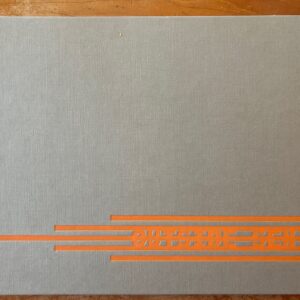JTF (just the facts): Self-published in 2020 (here). Softcover in a plastic jacket (24×33 cm), 64 pages, or 16 two-sided posters, with 45 color photographs. There are no texts or essays included. In an edition of 300 copies. (Cover and spread shots below.)
Comments/Context: The recent photobook HOAX by the Polish photographer Agnieszka Sejud immediately stands out with its vibrant colors – bright cut out letters and a sticker reading “Made in Poland” are placed on the plastic jacket containing the book. Inside, another splash of bold color, and an almost psychedelic visual flow, create the expectation of a fun and playful photographic narrative. But that first impression is rather deceiving. This book addresses the current political situation in Poland, from the suppression of women and sexual minorities to fake news, environmental disregard, and the privileges of the Catholic church. It’s much tougher and more biting than it first appears.
Earlier this October, a court ruling tightened what was already one of Europe’s most restrictive abortion laws, sparking a week of continuous protests, the biggest since the fall of communism in 1989. Andrzej Duda, the current Polish president, took office in 2015 on a socially conservative, religious platform. In July of this year, Duda narrowly won the re-election, and is likely to continue controversial reforms to the judiciary, tightened control over the public media, and opposition to abortion and gay rights. In many ways, contemporary Poland sits at a political flashpoint.
Sejud’s photobook book has a clever and lighthearted design. Housed inside a plastic jacket, the book doesn’t have any binding and consists of 16 loose double-sided folded spreads that can be arranged in any order. Sejud notes that this construction makes the book fall apart, just like Poland. HOAX is printed on glossy paper, and all the images are full bleed. Two small cards inserted in the sleeve contain the credit information, but the book itself has no captions, no texts, nor any other explanation of the contents. The title of the book describes today’s reality pushed by the politicians – “everything here feels fake now like we have lost our connection with nature and truth does not exist.”
Sejud says that officially she started the project in 2016, although she had been taking photographs long before that. “Politics here changed and intensified around that time and I wanted to make work about it, mostly to try to understand what was happening.”
Sejud’s photographs are visually intense and expressive, immersing us in a flow of brash colors and almost an overwhelming amount of densely packed visual information. There are images of colorful piles of hangers, rows of sunglasses for sale, mesh bags of onions, bouquets of flowers, market shelves packed with cleaning supplies, rolled up banknotes, and garbage bags full of flowers, each one seemingly framed to maximize its disorienting visual punch. Strong flash is used to illuminate these objects, making them look even more fake and strange.
In other images, Sejud liberally uses digital intervention (in modes similar to some of Lucas Blalock’s works), adding distortion, assembling busy collages, and most often multiplying image fragments into overlapped jumbles. This creates even more deliberate confusion, reinforcing the overall sense of uncertainty and untrustworthiness. In one photograph, a young woman sits on a chair with an enormous pile of flowers next to her, the flower pattern duplicated and inserted to fill her long sleeve shirt and her face. The digital manipulation in this image is obvious, yet it blends with the rest of the nearby imagery, keeping us strangely off balance.
Images of banal everyday objects are mixed with photographs of people and symbols of Polish culture. There are photographs of women in national costumes, a pile of boxes with LED flashing crosses, a man fixing a floor in a church, and a collage of frames with photographs from the First Holy Communion, all of these pulling on traditional religious motifs. She also plays with the colors of Polish flag, adding a number of shots that combine white and red. Through these images, Sejud shares her vision of Poland today, where propaganda, fake news, and information overload dominate the society and distort traditional values into surreal surface-only stand-ins for reality. Her photobook is a call to stay aware, to use critical thinking, and to stand up for what is right.
HOAX is a small, yet brilliant photobook, and it delivers its message with great force. It’s a well-conceived and executed contemporary protest book, using the metaphorical message of its visuals as a way to reflect and expose the dangers of populism and self-deception.
Collector’s POV: Agnieszka Sejud does not appear to have consistent gallery representation at this time. Collectors interested in following up should likely connect directly with the artist via her website (linked above in the sidebar).



















